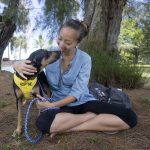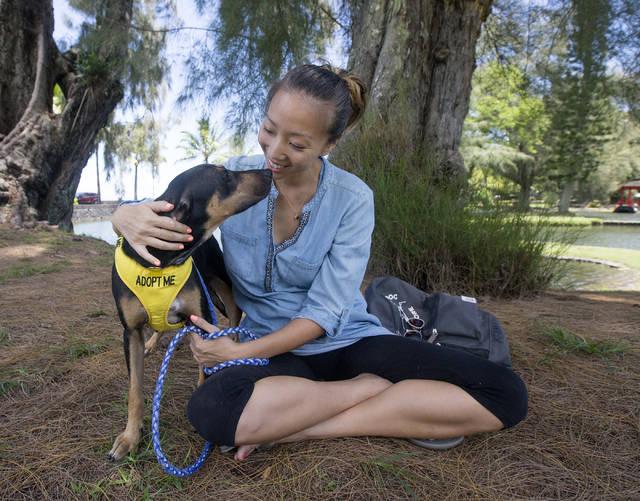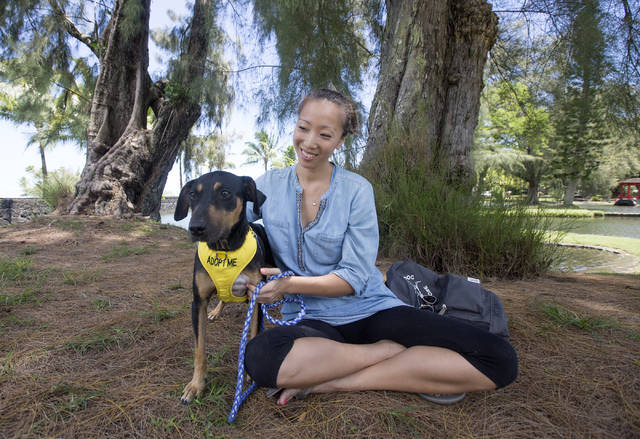Shelter dog Zena spends most days in a kennel. But Thursday was her lucky day.
The 2-year-old hound mix got a surprise trip to Lili‘uokalani Gardens in Hilo where she spent the afternoon romping through the park’s idyllic pathways and taking occasional dips in its multiple ponds.
Zena’s excursion was part of the Hawaii Island Humane Society’s Field Trips for Shelter Dogs program. The program started about a year and a half ago. It allows volunteers to “check out” a dog for the day from any one of the Humane Society’s three shelters, located in Keaau, Waimea and Kailua-Kona.
“It’s a great program, especially for families who are interested in adopting,” said Sara Kim, 37, of Hawaiian Paradise Park, who “checked out” Zena for the day. “You can take them home and see how they respond. Or, if you’re a dog lover living in a place that’s not dog friendly, it’s a great way to get your dog fix.”
The program is modeled after similar field trip programs at shelters on Kauai and Maui.
Humane Society employee Whitney Sickels, who works in the Kona office, said it’s a win-win for both parties. She said it benefits shelter pups to “get out of the shelter environment and get a break from the kennel.” She said field trips also help shelter staff learn about a dog prior to adopting — volunteers complete an assessment of the dog upon their return.
“A lot of times (dogs) come in, they’re in a kennel and they get adopted and we never really see ‘Are they good in a car?’ or ‘How are they around children?’” Sickels said. “So it’s a great way to see how they do.”
In a typical week, up to 10 dogs are checked out for field trips between all three shelters, Sickels said. On a typical day, the Humane Society collectively has in its shelters between 50 and 60 dogs, Sickels said, and the average stay varies — some are in the shelter for many weeks.
Field trip volunteers are provided with a backpack of supplies including an “Adopt Me” harness, a water bowl, towels and waste bags. Volunteers must be at least 18, sign a liability waiver and leave a credit card deposit, should the dog not be returned. Shelter staff also give volunteers a list of dog-friendly places nearby, Sickels said, and encourage volunteers to snap photos to post online. She said the program is especially popular at the Humane Society’s Kona shelter among tourists visiting the island.
“We were trying to find ways to provide enrichment for the animals and we saw other humane societies on other islands have had success with this program,” Sickels said, adding the program hasn’t had any major issues yet other than one field trip dog getting loose (it was eventually returned).
“… It was pretty successful from the beginning. Both residents and visitors like to participate. We even have a few visitors who have come and fell in love and we send them back to the mainland with (the field trip dog).”
Kim said she’d like to see the program become more popular in East Hawaii, however. She said she’s a longtime Humane Society volunteer and been taking dogs on field trips since the program got started — though she’s one of the few who do so at the Keaau shelter. She said she’s noticed a single field trip can greatly increase a dog’s chances for adoption.
She said she generally takes her field trip dogs to Lili‘uokalani Gardens — one of the few dog-friendly parks in East Hawaii — to maximize its exposure to the public.
“I feel like taking a dog out through the program really ups their chances (for adoption),” Kim said. “And I think it’s just so important to get them out. It means so much to them. You’re not just making their day, you might be making their week or their month.”
Field trip dogs can be checked out at the Keaau shelter from 9 a.m.-1 p.m. Monday through Saturday. They must be returned the same day by 3:30 p.m. at the Keaau shelter. Dogs also must be kept on leashes and in enclosed cars. For more information about the program, visit hihs.org/services/fieldtrips.
Email Kirsten Johnson at kjohnson@hawaiitribune-herald.com.









